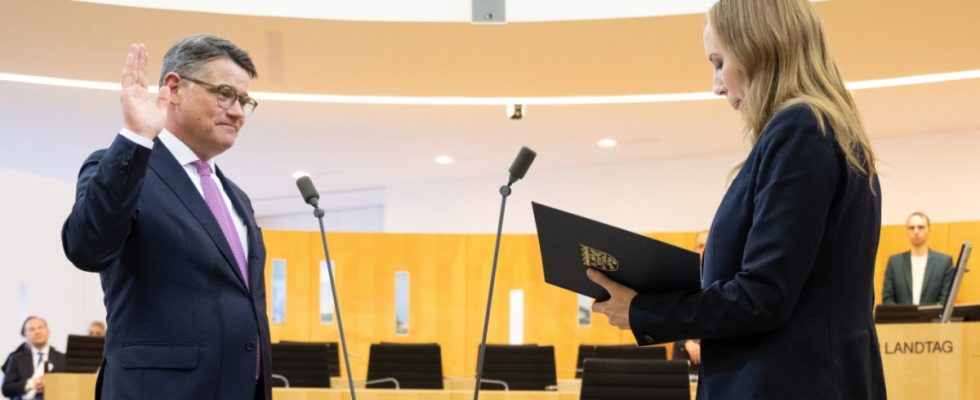And then it’s done. Boris Rhein was at the church service in Wiesbaden’s Marktkirche in the morning, and now he is sitting in the state parliament and watching as the members of parliament are called one by one to throw their ballot papers into the ballot boxes. His CDU, together with the SPD, has a stable majority, but something can always go wrong. It didn’t work. 76 out of 133 votes, making him the old and new Prime Minister of Hesse.
This Thursday, the first CDU-led grand coalition in the history of Hesse will begin its work. It’s a new beginning – but is it also a departure?
While Boris Rhein disappears behind a bouquet of flowers in the state parliament, a quick look back. Last October, the CDU won the election with 34.6 percent. This put them well ahead of the SPD, which got 15.1 percent, and the Greens, who got 14.8 percent. It was already clear on election evening: a winner would negotiate with two losers. The fact that the CDU then decided against the Greens – its previous coalition partner – and in favor of the SPD had to do with “larger common overlaps”, for example in questions of internal security. The Greens say: because of it.
By breaking away from the Greens, Boris Rhein is also breaking away from Bouffier
Boris Rhein took over the office of Prime Minister from Volker Bouffier in May 2022, but the takeover has a history. Bouffier originally wanted to appoint his finance minister as his successor, but he died and he also had to remove several other names from the list because they would have been difficult to communicate to the Greens. That’s how he came to Boris Rhein. He then moved to a state chancellery where Bouffier had sat for more than two decades and took over a coalition that Bouffier had forged, and it probably cannot be ruled out that he remembered this in the past few weeks. By breaking away from the Greens, he is also breaking away from Bouffier. It’s his government now.
Down in the state parliament, Boris Rhein now takes the lectern, he thanks him for being able to “continue to lead” this country, and of course the question is: in which direction?
If you look at the coalition agreement, the first thing you notice is the direction in which things are not going. In his first Government statement In May 2022 – the Greens had just co-elected him – there was a lot about the climate. He spoke of extreme weather events and their consequences, of 90,000 hectares of forest that had fallen victim to drought in just five years. Climate protection is a “central issue for the future,” which is why the state government is placing it at the “center of our policy.”
The issue of climate has been pushed to the sidelines in the coalition agreement
In this Coalition agreement the topic has moved to the periphery of politics. There are only a few measurable goals and there is no longer a ministry that is nominally responsible. Instead, the future environment minister will take care of “agriculture, viticulture, forestry, hunting and homeland.” To put it bluntly: about everything except the climate.
The focus of the coalition agreement is now, among other things, the issue of migration. The state government wants to expand deportation detention, set up repatriation centers, and refugees in the initial reception centers should be given payment cards instead of cash. “We are starting a real repatriation offensive,” it says, and perhaps it is worth remembering at this point that although the CDU negotiated many points in the contract, the SPD signed it. Also the law and order part.
The session in the state parliament in Wiesbaden has now been interrupted, Boris Rhein appoints his cabinet, nine ministers and three female ministers. “This in no way reflects the breadth of society,” he commented Hessian radio.
The Greens criticize that the CDU and SPD want to go back to the past
While the new cabinet members receive their certificates, there is time for coffee with a Christian Democrat. Sure, says the man, the CDU won the election, and sure, Boris Rhein is continuing to restructure it. “It forms a center of power.” But he couldn’t understand the criticism of the coalition agreement, a lot of praise had come from business, and the fact that the Greens, who are no longer in government, are now saying that the CDU and SPD want to go back to the past is just an expression of their frustration. “If people had wanted green politics, they could have voted for the Greens,” says the man.
Instead, the majority of people voted for the CDU and elected Boris Rhein, who is returning to the state parliament to swear in his cabinet. The last item on the agenda is the new state government. From now on, the CDU and SPD can show what they want to use their power for, and the Prime Minister can show exactly which direction he wants to lead this country. The cameras click one last time. It’s just a snapshot.

